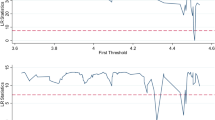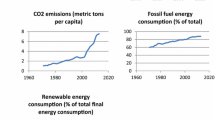Abstract
The purpose of this paper is to research the relation among environmental quality and renewable energy in the RECAI country group. The study used per capita CO2 emission, energy intensity, and Aggregate National Savings as a measure of environmental quality. Other variables used in the study are renewable energy consumption, fossil fuel consumption, GDP per capita, and foreign direct investments. In the study, three different models to see different environmental quality indicators by panel quantile method for 19202090–. According to the results obtained, unlike other models, renewable energy consumption in model 1 positively affects energy intensity in all quantiles. In other words, renewable energy consumption negatively affects environmental quality. In model 1 and model 3, the coefficients of fossil fuel consumption were positive and negative, respectively. Unlike model 2, the coefficient estimates of fossil fuel consumption in model 3 were predominantly negative. Fossil fuel consumption shows a positive effect on environmental quality, which is similar to model 1. Economic growth negatively affects environmental quality in all models. There is a one-way causal relationship from renewable energy consumption to energy intensity and energy intensity to growth.
Similar content being viewed by others
References
Acheampong AO, Adams S, Boateng E (2019) Do globalization and renewable energy contribute to carbon emissions mitigation in sub-Saharan Africa? Sci Total Environ 677:436–446
Adedoyin FF, Ozturk I, Agboola MO, Agboola PO, Bekun FV (2021) The implications of renewable and non-renewable energy generating in sub-Saharan Africa: the role of economic policy uncertainties. Energy Policy 150:112115
Ahmad A, Zhao Y, Shahbaz M, Bano S, Zhang Z, Wnag S, Liu Y (2016) Carbon emissions, energy consumption and economic growth: an aggregate and disaggregate analysis of the Indian economy. Energy Policy 96:131–143
Alola AA, Kirikkaleli D (2019) The nexus of environmental quality with renewable consumption, immigration, and healthcare in the US: wavelet and gradual-shift causality approaches. Environ Sci Pollut Res 26:35208–35217
Ansari MA, Haider S, Masood T (2020) Do renewable energy and globalization enhance ecological footprint: an analysis of top renewable energy countries? Environ Sci Pollut Res 28:6719–6732. https://doi.org/10.1007/s11356-020-10786-0
Apergis N (2016) Environmental Kuznets curves: New evidence on both panel and country-level CO2 emissions. Energy Econ 54:263–271 ISSN 0140-9883
Apergis N, Ozturk I (2015) Testing Environmental Kuznets Curve hypothesis in Asian countries. Ecol Indic 52:16–22 ISSN 1470-160X
Apergis N, Ben Jebli M, Ben Youssef P (2018) Does renewable energy consumption and health expenditures decrease carbon dioxide emissions? Evidence for sub-Saharan Africa countries. Renew Energy 127:1011–1016
Aslan A, Oguz O (2016) The role of renewable energy consumption in economic growth: evidence from asymmetric causality. Renew Sust Energ Rev 60:953–959
Atholia T, Flannigan G, Lai S (2020) Renewable Energy Investment in Australia. Reserve Bank of Australia
Azam, M., Khan, A.Q., Zaman, K., & Ahmad,M. (2015). Factors determining energy consumption: evidence from Indonesia, Malaysia and Thailand. Renew Sust Energ Rev, 42, 1123-1131.
Balsalobre-Lorente D, Shahbaz M, Roubaud D, Farhani S (2018) How economic growth, renewable electricity and natural resources contribute to CO2 emissions? Energy Policy 113:356–367
Bekun FV, Alola AA, Sarkodie SA (2018) Toward a sustainable environment: Nexus between CO2 emissions, resource rent, renewable and nonrenewable energy in 16-EU countries. Sci Total Environ 657:1023–1029
Bhattacharya M, Paramati SR, Ozturk I, Bhattacharya S (2016) The effect of renewable energy consumption on economic growth: evidence from top 38 countries. Appl Energy 162:733–741
Binder M, Coad A (2011) From Average Joe’s happiness to Miserable Jane and Cheerful John: using quantile regressions to analyze the full subjective well-being distribution. J Econ Behav Organ 79(3):275–290
Brundtland GH (1987) World commission on environment and development, our common future, report. Oxford University Press, Oxford
Chandio AA, Rauf A, Jiang Y, Ozturk I, Ahmad F (2019) Cointegration and causality analysis of dynamic linkage between ındustrial energy consumption and economic growth in Pakistan. Sustainability 11:4546. https://doi.org/10.3390/su11174546
Danish, Zhang B, Wang Z, Wang B (2018) Energy production, economic growth and CO2 emission: evidence from Pakistan. Nat Hazards 90:27–50
Dogan E, Madaleno M, Altinoz B (2020) Revisiting the nexus of financialization and natural resource abundance in resource-rich countries: new empirical evidence from nine indices of financial development. Res Policy 69:101839
Galvao AF (2011) Quantile regression for dynamic panel data with fixed effects. J Econ 164(1):142–157
Granger CWJ (1969) Investigating causal relations by econometric models and cross-spectral methods. Econometrica 37(3):424
Grossman GM, Krueger AB (1991) Environmental impacts of a North American Free Trade Agreement. NBER Working Papers 3914, National Bureau of Economic Research, Inc
Hanif I, Faraz Raza SM, Gago-de-Santos P, Abbas Q (2019) Fossil fuels, foreign direct investment, and economic growth have triggered CO2 emissions in emerging Asian economies: some empirical evidence. Energy. 171:493–501
Hu H, Xie N, Fang D, Zhang X (2018) The role of renewable energy consumption and commercial services trade in carbon dioxide reduction: evidence from 25 developing countries. Appl Energy 211:1229–1244
Ike GN, Usman O, Alola AA, Sarkodie SA (2020) Environmental quality effects of income, energy prices and trade: the role of renewable energy consumption in G-7 countries. Sci Total Environ 721:137813
Jaganmohan M (2021) Renewable energy investments in the U.S. 2004–2019. Statista Country Reports. https://www.statista.com/statistics/186818/north-american-investment-in-sustainable-energy-since-2004/
Koenker R (2004) Quantile regression for longitudinal data. J Multivar Anal 91(1):74–89
Koenker R, Bassett G (1978) Regression quantiles. Econometrica 46(1):33
Lamarche C (2010) Robust penalized quantile regression estimation for panel data. J Econ 157(2):396–408
Moner-Girona M, Solano-Peralta M, Lazopoulou M, Ackom EK, Vallve X, Szabó S (2018) Electrification of Sub-Saharan Africa through PV/hybrid mini-grids: reducing the gap between current business models and on-site experience. Renew Sust Energ Rev 91:1148–1161
Nathaniel SP, Iheonu CO (2019) Carbon dioxide abatement in Africa: the role of renewable and non-renewable energy consumption. Sci Total Environ 679:337–345
Ozcan B, Apergis N, Shahbaz M (2018) A revisit of the environmental Kuznets curve hypothesis for Turkey: new evidence from bootstrap rolling window causality. Environ Sci Pollut Res 25:32381–32394. https://doi.org/10.1007/s11356-018-3165-x
Paramati SR, Alam MS, Apergis N (2018) The role of stock markets on environmental degradation: a comparative study of developed and emerging market economies across the globe. Emerg Mark Rev 35:19–30 ISSN 1566-0141
Pesaran MH (2007) A simple panel unit root test in the presence of cross-section dependence. J Appl Econ 22(2):265–312
RECAI (2020) Renewable energy country attractiveness Index, Issue: 56. https://assets.ey.com/content/dam/ey-sites/ey-com/en_gl/top
Salahuddin M, Gow J (2019) Effects of energy consumption and economic growth on environmental quality: evidence from Qatar. Environmental Science and Pollution
Salahuddin M, Habib MA, Al-Mulali U, Ozturk I, Marshall M, Ali MI (2020) Renewable energy and environmental quality: a second-generation panel evidence from the Sub Saharan Africa (SSA) Countries. Environ Res 110094
Shahbaz M, Hoang THV, Mahalik MK, Roubaud D (2017) Energy consumption, financial development and economic growth in India: new evidence from a nonlinear and asymmetric analysis. Energy Econ 63:199–212
Shahbaz M, Raghutla C, Chittedi KR, Jiao Z, Vo XV (2020) The effect of renewable energy consumption on economic growth: evidence from the renewable energy country attractive index. Energy 118162
Sharif A, Baris-Tuzemen O, Uzuner G, Ozturk I, Sinha A (2020) Revisiting the role of renewable and non-renewable energy consumption on Turkey’s ecological footprint: evidence from Quantile ARDL approach. Sustain Cities Soc 57:102138
Twerefou DK, Kwadwo DM, Godfred AB (2017) The environmental effects of economic growth and globalization in Sub-Saharan Africa: a panel general method of moments approach. Res Int Bus Financ 42:939–949
Ullah, S., Apergis, N., Usman, A., Chishti M.Z. Asymmetric effects of inflation instability and GDP growth volatility on environmental quality in Pakistan. Environ Sci Pollut Res 27, 31892–31904 (2020). https://doi.org/10.1007/s11356-020-09258-2
Usman A, Ullah S, Ozturk I, Chisti MZ, Zafar SM (2020) Analysis of asymmetries in the nexus among clean energy and environmental quality in Pakistan. Environ Sci Pollut Res 27:20736–20747
Wang N, Zhu H, Guo Y, Peng C (2018) The heterogeneous effect of democracy, political globalisation, and urbanisation on PM2.5 concentrations in G20 countries: evidence from panel quantile regression. J Clean Prod 194(2018):54–68
Zafar MW, Shahbaz M, Sinha A, Sengupta T, Qin Q (2020) How renewable energy consumption contribute to environmental quality? The role of education in OECD countries. J Clean Prod 268:122149
Funding
The authors received no financial support for the research, authorship, and/or publication of this article.
Author information
Authors and Affiliations
Contributions
Writing—original draft, conceptualization: ND; writing—original draft: AA; data curation: BO; supervision, project administration: AA. The authors read and approved the final manuscript.
Corresponding author
Ethics declarations
Ethics approval and consent to participate
Not applicable
Consent for publication
Not applicable.
Conflict of interests
The authors declare that they have no conflict of interests.
Availability of data and materials
Not applicable
Additional information
Responsible Editor: Nicholas Apergis
Publisher’s note
Springer Nature remains neutral with regard to jurisdictional claims in published maps and institutional affiliations.
Rights and permissions
About this article
Cite this article
Aslan, A., Ozsolak, B. & Doğanalp, N. Environmental quality and renewable energy consumption with different quality indicators: evidence from robust result with panel quantile approach. Environ Sci Pollut Res 28, 62398–62406 (2021). https://doi.org/10.1007/s11356-021-15181-x
Received:
Accepted:
Published:
Issue Date:
DOI: https://doi.org/10.1007/s11356-021-15181-x




